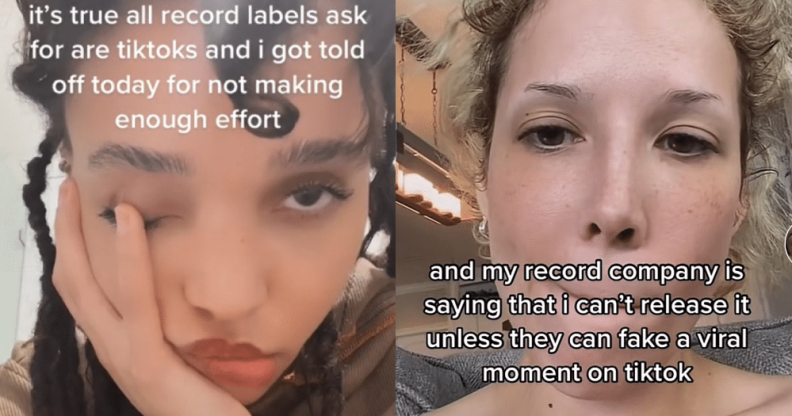Halsey’s claim label is blocking new music until they go viral on TikTok highlights troubling trend

FKA twigs and Halsey have both spoken about being pressured to do TikTok. (Twitter)
Halsey’s claim that her record label is putting pressure on her to go viral on TikTok has shone a light on a troubling trend
Halsey alleged on 22 May that their record label is demanding they fake a viral TikTok moment before it will release their new music.
“Everything is marketing and they are doing this to every artist these days,” Halsey said on TikTok. “I just want to release music, man and I deserve better tbh. I’m tired.”
Halsey’s post sparked a widespread discussion about the treatment of artists, especially women, by the music industry in a shifting social media landscape.
It isn’t the first time artists have spoken out about such tactics. Back in March, Florence Welch, from Florence + The Machine, posted a video of herself giving an exasperated sigh before breaking out into song. The caption read: “The label are begging for me for ‘low fi tik toks’ so here you go. Pls send help x“.
@florence The label are begging me for ‘low fi tik toks’ so here you go. pls send help ☠️ x
Another artist who has spoken about being pressured to go viral is FKA twigs. In a TikTok video, which has since been deleted, the performer said “it’s true all record labels ask for are TikToks”, and that she was told she wasn’t making enough effort.
Screenshots of twigs’ deleted posts are now doing the rounds on social media, along with an October post by Charli XCX.
what do charli xcx, fka twigs & halsey have in common? pic.twitter.com/B9k896JOsG— ~s (iichliwp)? (@phleshamnesiac) May 22, 2022
Charli’s post showed her looking fed up, with a text overlay that reads: “When the label asks me to make my 8th tiktok of the week.”
However, after the post resurfaced, Charli XCX said she was just “lying for fun”.
not me – i was just lying for fun https://t.co/Gucd7NgFbc— Charli (@charli_xcx) May 24, 2022
While Charli may have been joking, it’s clear that the pressure of going viral on social media is a reality, one that is preventing many up and coming artists from getting their big break.
One such singer is Betty Who, an independent artist who has struggled to find a label willing to sign her.
Speaking to the Las Culturistas podcast, Who said: “There’s not a single record label in this town that will sign me. They all turned me down.
“This is where it’s shifting, [labels] go: ‘We wanna sign people with a viral hit on TikTok only.'”
Some artists are so annoyed that they’ve written and performed parodies on the very platform they’re condemning.
American singer-songwriter, Gavin DeGraw, best known for his single “I Don’t Want To Be”, the theme song to One Tree Hill, changed the lyrics of his popular song to emphasise his displeasure.
@gavindegraw Better late than never. ♬ original sound – Gavin DeGraw
For the most part, people have been in support of these artists’ honesty, feeling that music shouldn’t be about viral content. However, there are some who feel that doing things you hate is simply part of the working world.
But the issue for many performers isn’t having to make social media posts, it’s the pressure to go viral. In a world where trending news is a commodity, users can spot genuine articles from the fakes.
As more and more creatives, from all different backgrounds, throw their hat into the ring, this story will gain traction whether record labels want it to or not.

